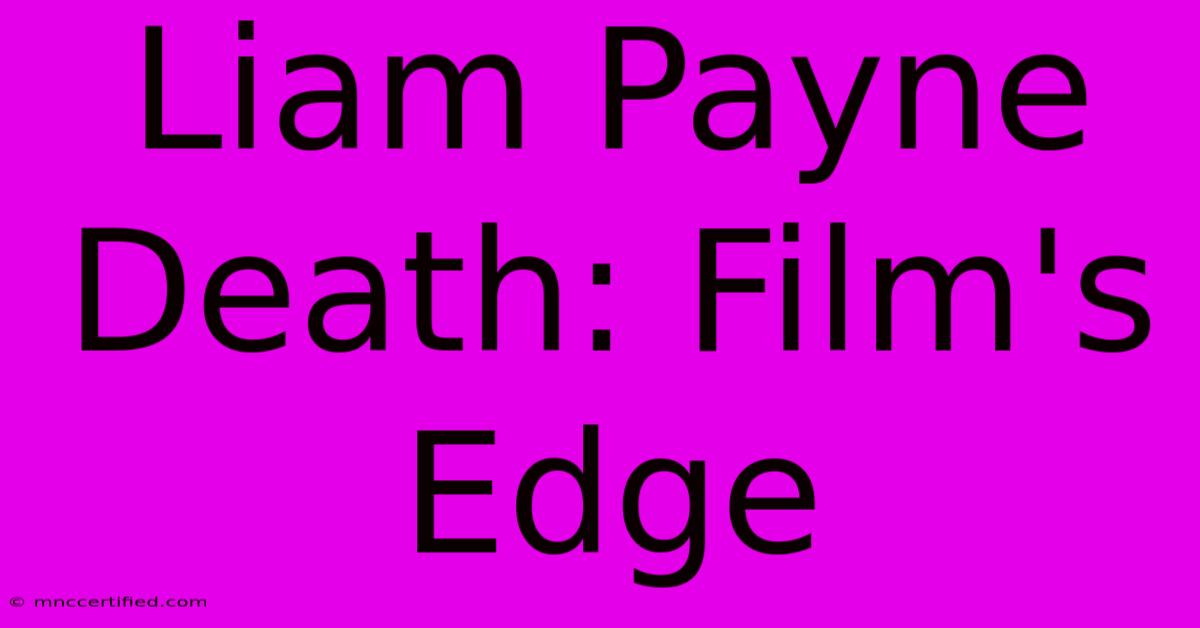Liam Payne Death: Film's Edge

Table of Contents
Liam Payne Death: Film's Edge – A Deep Dive into Misinformation and the Power of Rumours
The internet, a powerful tool for connection and information, is also a breeding ground for misinformation. Recently, a disturbing rumour circulated online claiming the death of Liam Payne, the former One Direction member. This rumour, spread through various social media platforms and websites, highlights the dangerous ease with which false information can spread and the impact it has on individuals and their families. This article will explore the "Liam Payne death" rumour, debunking the falsehood and examining the underlying issues behind the spread of such misinformation.
Debunking the Falsehood: Liam Payne is Alive and Well
To be unequivocally clear: Liam Payne is not dead. The rumour of his death is entirely false and has been debunked by several reliable sources. There has been no official statement from Payne himself, his representatives, or credible news outlets confirming his death. The rumour likely originated from a hoax or malicious attempt to spread misinformation, highlighting the vulnerability of public figures to online harassment and the creation of false narratives.
The Psychology Behind Believing and Spreading False Information
Why do people believe and spread such harmful rumours? Several psychological factors contribute:
- Confirmation Bias: Individuals may be more likely to believe information that confirms their pre-existing beliefs or desires, regardless of its veracity. This can be especially true for fans who might be feeling anxious or concerned about their idols.
- Emotional Contagion: The emotional intensity of a rumour – especially one as dramatic as a celebrity death – can be contagious. People may share it simply because they are shocked or saddened, without verifying its accuracy.
- Lack of Media Literacy: Many individuals lack the critical thinking skills necessary to evaluate the credibility of online sources. This makes them more susceptible to believing false information presented in a convincing manner.
- The "Spreadability" of Misinformation: Sensationalist headlines and easily shareable formats on social media platforms accelerate the spread of misinformation, regardless of its truthfulness.
The Impact of Misinformation: Beyond Simple Belief
The consequences of spreading false information like the Liam Payne death hoax extend far beyond simple belief. Such actions can:
- Cause Emotional Distress: For fans, the belief in a celebrity's death can cause significant emotional distress, anxiety, and grief. The sudden shock and uncertainty can be profoundly damaging.
- Damage Reputation: False reports can significantly harm the reputation of the individual involved. This can affect their career, personal relationships, and overall well-being.
- Erode Trust in Media: The spread of misinformation undermines public trust in credible news sources and institutions. When false information spreads as rapidly as truth, it becomes difficult to distinguish between fact and fiction.
Combating Misinformation: A Collective Responsibility
Combating the spread of misinformation requires a multi-pronged approach:
- Critical Thinking and Media Literacy: Individuals need to develop critical thinking skills and media literacy to evaluate the credibility of information sources. This includes checking multiple sources and verifying information before sharing it.
- Social Media Platforms' Responsibility: Social media companies must take greater responsibility for policing their platforms and removing false or misleading content. This includes implementing stricter verification processes and algorithms designed to detect and flag misinformation.
- Fact-Checking Organizations: Support and promote the work of fact-checking organizations that actively debunk misinformation and promote media literacy.
- Responsible Reporting: Journalists and news organizations must uphold high standards of accuracy and journalistic ethics. Avoiding sensationalist headlines and prioritizing verified information are crucial.
The "Liam Payne death" rumour serves as a stark reminder of the power and potential harm of misinformation in the digital age. By understanding the psychology behind its spread and implementing strategies to combat it, we can work towards a more informed and responsible online environment. Remember to always verify information before sharing it, and be critical of the sources you encounter online. Let's collectively strive to create a digital space where truth prevails.

Thank you for visiting our website wich cover about Liam Payne Death: Film's Edge. We hope the information provided has been useful to you. Feel free to contact us if you have any questions or need further assistance. See you next time and dont miss to bookmark.
Featured Posts
-
Why Did My Renters Insurance Go Up
Nov 17, 2024
-
Australia Clinches Series Johnsons Five Wicket Haul
Nov 17, 2024
-
Carpenter Aguileras Los Angeles Duet
Nov 17, 2024
-
Nations League Netherlands Wins 2 0 64 Mins
Nov 17, 2024
-
Alabama Mercer Game Live Updates And Scores
Nov 17, 2024